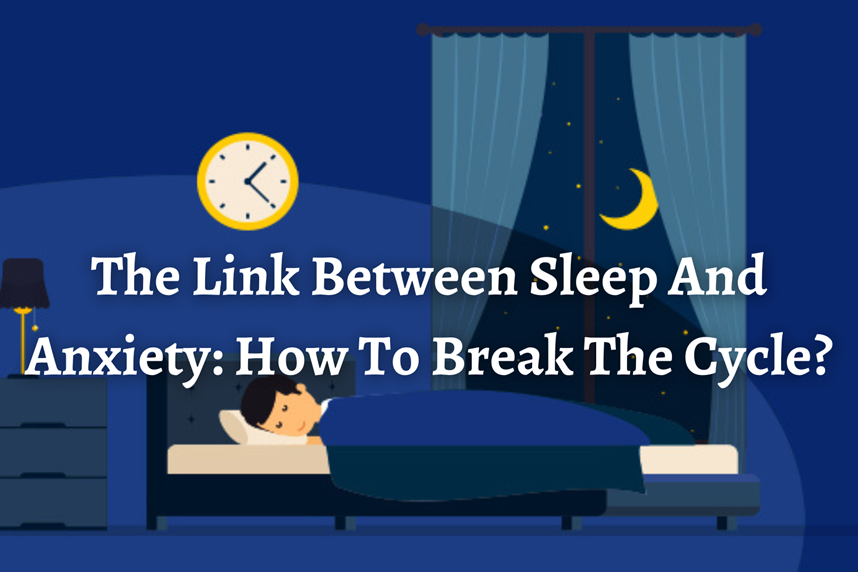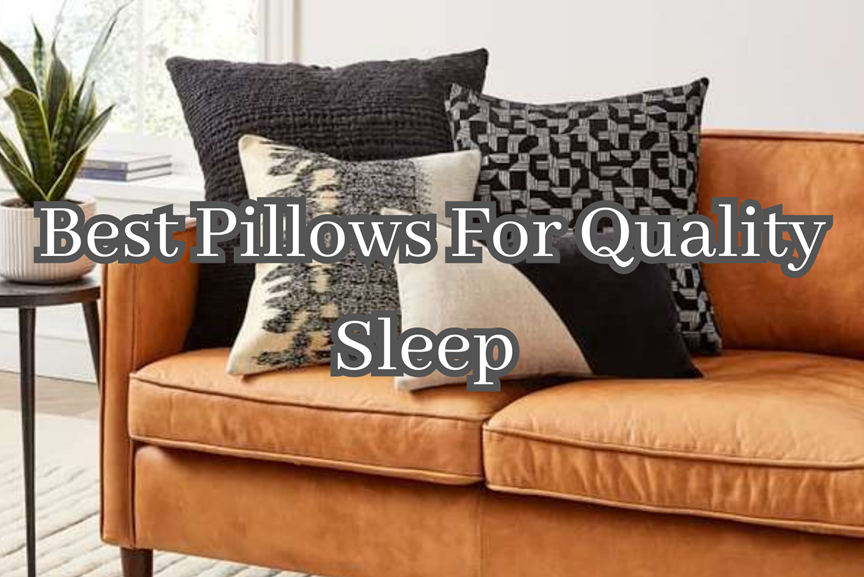Sleep and anxiety are closely related, and often one affects the other in a cycle that makes things worse. Anxiety can make it hard to fall asleep or stay asleep, and not getting enough sleep can make anxiety worse.
It’s important to understand this connection if you want to break the cycle and get better sleep with less anxiety. In this article, we’ll talk about how sleep and anxiety are related and how to break the cycle. We will also tell you about some of the best pillows that can give you comfort and a good nights sleep.
Anxiety and not being able to sleep go together. When you’re stressed out, it can be hard to fall asleep. But if you don’t get enough sleep, you might feel more stressed. This can lead to a never-ending cycle of stress, tiredness, and trouble sleeping.
The best way to break the cycle of anxiety and insomnia is to treat both problems at the same time. If you can get rid of your stress before bed, it will be easier to fall asleep. If you get a good night’s sleep, you’ll be better able to deal with anxiety the next day.
The Connection Between Sleep And Anxiety
Anxiety can make it hard to fall asleep or stay asleep, wake you up too early, or make your sleep restless or unsatisfying. This can make you tired, irritable, and have trouble focusing during the day.
One reason for this is that both sleep and anxiety affect the body’s system for dealing with stress. Cortisol, a stress hormone, can rise if you don’t get enough good sleep. This can make anxiety symptoms worse.
Also, anxiety can turn on the body’s stress response system, which makes it harder to fall and stay asleep.
Here Are 10 Steps of Sleep Hygiene That Also Reduce Anxiety
Sleep hygiene is making sure you have healthy habits and routines that can help you sleep better. If you don’t take care of yourself before bed, you might have trouble falling asleep or staying asleep. This can lead to stress and anxiety.
But if you follow a few simple steps, you can get into a healthy sleep routine and feel less anxious.
- Do something physical during the day. Exercise helps you sleep by making you less alert, worried, and sad.
- Don’t drink any caffeine in the afternoon or evening.
- Start meditating on the present moment. It has been shown that a “mind-calming practice that focuses on breathing and being aware of the present moment” can help you feel less anxious and sleep better at night.
- Don’t use a screen in the two hours before bed.
- Sleep on a mattress that feels good. If you have back pain and anxiety at the same time, make sure you sleep on a mattress that cradles you and takes the pressure off your pressure points.
- Use the best pillow for your sleep position and comfort level to ensure a good night’s sleep. A comfortable pillow can reduce neck and back pain and provide proper support for your head and neck.
- Don’t use alcohol to help you fall asleep. Alcohol’s effects on arousal lead to anxiety and a lack of sleep in the long run.
- Sleep in a room that is dark, quiet, and cool.
- Ask your doctor if a disease or a medication’s side effects could be the root of both your insomnia and anxiety.
- Create a self-soothing, sleep-inducing routine by doing things that make you feel calm and ready for bed (a relaxing bath, listening to a sleep meditation hypnosis app, etc.).
Relaxation Before Sleep
There are many things you can do to make it easier to sleep at night and lessen your anxiety. Easy ways to get a good night’s sleep are to have good sleep hygiene, keep a regular sleep schedule and bedtime routine, and avoid sleep traps.
Yoga, meditation, a healthy place to sleep, and other things can help you sleep in a way that relaxes and heals you.
What Is The Optimal Pillow Based On Your Sleeping Position?
When choosing a pillow, you should think about how you sleep. Depending on whether you sleep on your back, side, or stomach, your spine will be in a different position, and your head and neck will need more or less support while you sleep.
You can choose or change the size, height, and firmness of a pillow to fit the way you usually sleep.
Back Sleeper
Back sleepers need a cushion that supports their neck curve. A cervical pillow is higher in the bottom third and slopes down in the center, where your head lies.
Back sleepers need a medium-firm pillow to align the head and spine. It keeps the pillow from flattening when sleeping. Memory foam pillows mold to your head and neck.
Side sleeper
Most people sleep on their sides, whether fetal or straight. Side sleepers need taller, firmer pillows.
Side sleepers should use a 4–6-inch pillow to adjust their ears and shoulders. This position prevents neck strain and improves sleep posture. Side sleepers can support their pelvis and hips with body pillows.
Stomach Sleeper
Stomach sleepers may need to examine what regions of their body need assistance to preserve spinal alignment.
If you sleep on your stomach, a softer, lower-height pillow may be better. Down and feather fill compresses easily.
A body pillow may help if you sleep on your stomach and side or with your arms under your torso. Sleeping around a body pillow feels like sleeping on your stomach, but it lets you align your head and neck with your shoulders and hips.
Better Quality Sleep With A Good Quality Pillow
A good night’s sleep is important for our health and happiness. The type of pillow we use is an important thing that can affect how well we sleep. If your pillow is too soft, too hard, or doesn’t give you enough support, it can be uncomfortable and make it hard to sleep.
Memory foam pillows are the best choice if you want to sleep in comfort and support. Memory foam pillows mold to the shape of your head and neck, giving you the best support and relieving pressure. They are also hypoallergenic, which is good for people who have allergies or sensitive skin.
Down pillows are another popular choice. The soft, fluffy feathers of ducks or geese are used to make these pillows. They are easy to carry and feel soft and expensive. But down pillows can lose their shape over time, and some people may not find them to be firm enough.
Latex pillows are another option for people who want to sleep on something comfortable and supportive. The natural latex used to make these pillows gives them a firm but springy feel. Latex pillows are also resistant to dust mites and don’t cause allergies.
This makes them a good choice for people with allergies. If you sleep on your side, you should use a firm pillow to keep your head and neck in the right place. If you sleep on your back, use a medium-firm pillow, and if you sleep on your stomach, use a soft pillow so you don’t strain your neck.
Conclusion
There is a clear link between not getting enough sleep and being anxious. The symptoms of anxiety can get worse when you don’t get enough sleep, and anxiety can make it hard to sleep.
To break the cycle, it’s important to deal with both the anxiety and sleep problems that are making it happen.
When it comes to pillows, the best ones for sleep are the ones that support your head, neck, and shoulders well, are comfortable, and let your skin breathe.
Sleep and anxiety are closely linked, and the only way to break the cycle is to deal with both. By getting into good sleep habits, using a supportive pillow, and dealing with anxiety in different ways, you can improve both the quality of your sleep and your mental health as a whole.









